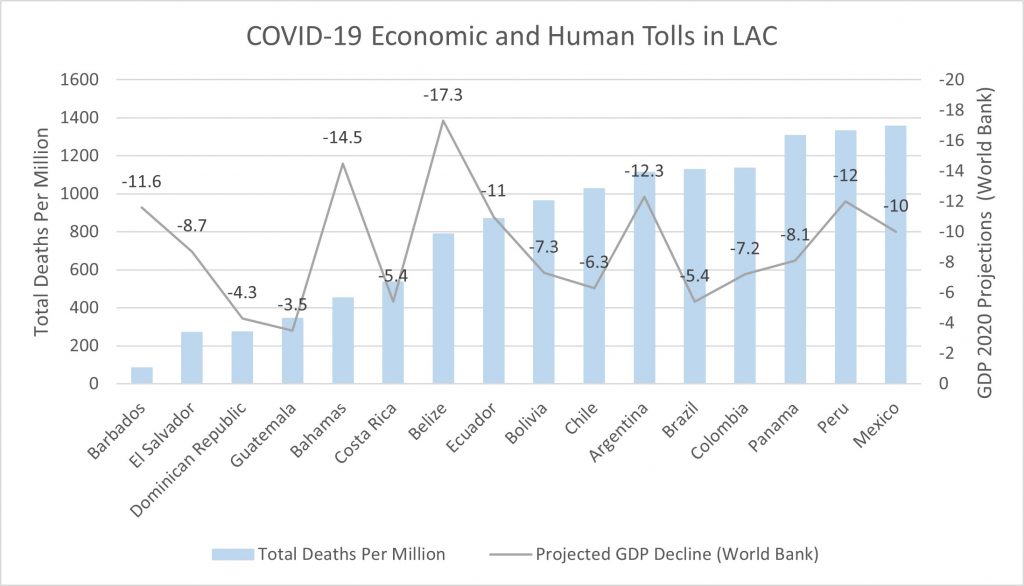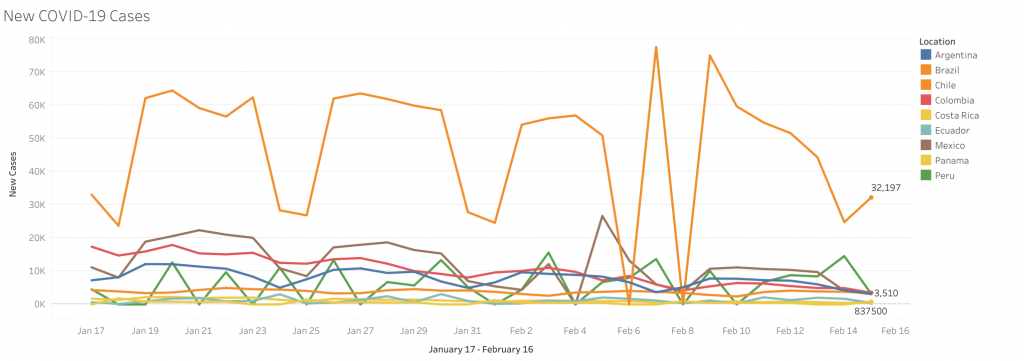What you should know
- 16 million: The number of people who have fallen into poverty in Latin America and the Caribbean due to the pandemic. The IMF also reports employment remains below pre-crisis levels, causing more permanent social damage and inequality.
- 37 percent: Latin America is the fastest-growing regional e-commerce market in the world, growing 36.7 percent in 2020. Argentina was the fastest growing, followed by Brazil and Mexico.
- Gender gap in trade: Women don’t benefit from trade as much as men, according to the IDB. In Latin America and the Caribbean, women still face more regulatory hurdles, have fewer skills, less access to capital, and spend more time in unpaid work than men.
- 12 million: According to the Peruvian National Health Institute, 12 million Peruvians have contracted COVID-19, approximately 40 percent of the population. Here are this week’s figures.
Health + Innovation
- Colombia: COVID-19 vaccinations began on February 17, following the arrival of the country’s first batch from Pfizer. The health ministry announced more than 5.7 million doses are expected to arrive in Colombia in February and March.
- Guatemala: 400,000 vaccine dosesare expected to arrive through the COVAX mechanism by late February. The Government released its COVID-19 vaccination rollout plan, which seeks to vaccinate 8 to 10 million people in 2021.
- Canada: A commitment to buy an additional 4 million doses of Moderna’s COVID-19 vaccine will bring its confirmed order commitment to 44 million doses.
- Venezuela: Regime officials and opposition leaders met to discuss purchasing COVID-19 vaccines through the COVAX mechanism. Juan Guaidó said funds frozen by the US Treasury Department could be used to buy the vaccines.
- AstraZeneca-Oxford: On February 15, the World Health Organization (WHO) authorized the AstraZeneca-Oxford COVID-19 vaccine for distribution. Through the COVAX mechanism, the WHO will deploy hundreds of millions of doses of the vaccine, which is cheaper and easier to store than most mRNA vaccines.
- Janssen: The European Medicines Agency (EMA) is reviewing the COVID-19 vaccine developed by Janssen. The vaccine is the fourth application received by the EMA, following the Pfizer-BioNTech, Moderna, and AstraZeneca vaccines, all which have been authorized in the EU.
- Vaccine rollout: The Pan American Health Organization (PAHO) is urging countries to share vaccine rollout information through the Vaccine Introduction Readiness Tool (VIRAT), an online platform developed by the WHO, UNICEF, and Gavi.
Economies in focus
Multilateral Analysis
- A special report from ECLAC shows that the COVID-19 pandemic will set back women in Latin America more than a decade in terms of labor participation. Workforce participation among women fell to 46 percent in 2020 from 52 percent in 2019. Men’s participation fell from 74 percent to 69 percent.
- The IMF concluded its first official visit to Colombia since the start of the pandemic and recommended that Colombia undertake a tax reform, a pension reform, and strengthen fiscal rule over the course of five years.
- The IMF also concluded a mission to Peru and issued recommendations to strengthen economic recovery: increase productivity, increase social protections while reducing incentives for informality, and strengthen government institutions at the federal and local levels.
- The International Labour Organization reported that the expansion of the digital economy, propelled by the COVID-19 pandemic, is creating more inclusive work opportunities.
Economic Relief
- On February 16, the Inter-American Development Bank launched a series of Private-Sector Partners Roundtable on the Future of Latin America and the Caribbean. The initiative will convene action-oriented working groups of private sector leaders to identify partnership opportunities in priority areas.
- Mexican authorities extended a relaxation of liquidity requirements for banks for an additional six months but cautioned that they would phase out the measure within one year.
Economic Impact
- The cancelation of Brazil’s Carnival celebrations, originally planned for February 12-17, means Brazilian street vendors will miss what is often the biggest payday of the year.
- Bolivia also canceled Carnival celebrations, impacting 629,000 people economically with losses totaling $50 million, according to the Ministry of Culture and Tourism.
- Colombia’s statistical agency reported that the economy contracted by 6.8 percent in 2020, the worst decline since the country started recording economic growth in 1975.
Quarantine + Travel Restrictions
Quarantines
- On February 18, 23 communities moved beyond the quarantine phase to the transition phase on Chile’s step-by-step reopening plan and 11 communities moved from the transition to the preparation phase. In contrast, 13 communities fell back by re-entering the transition phase and 4 re-entered quarantine.
- On February 15, the Mexican Ministry of Health announced that Chiapas would become the first state to return to the green (low risk) on the country’s four-color traffic light reopening plan. Of Mexico’s 32 states, 8 are classified as yellow (medium risk), 21 states are classified as orange (high risk), and only 2 are classified as red (extreme risk).
In Focus: The Vaccine Passport Debate
- In an effort to normalize travel while still containing the spread of COVID-19, a number of countries in Europe are developing digital vaccine passports to show travelers’ vaccination status.
- The UK, however, is not considering issuing such passports, arguing they are discriminatory. Vaccine minister Nadhim Zahawi instead suggested travelers could talk to their doctors if they need written evidence for traveling purposes.
- Last month, a coalition of health and technology companies announced a joint effort to create a “trustworthy, traceable, verifiable, and universally recognized digital record of vaccination status” that would allow people to “safely return to work, school, events, and travel.”
- The coalition includes Microsoft, Oracle, Salesforce, and the Mayo Clinic, among others, and would allow individuals to obtain a copy of their immunization records, while those without smartphones would receive paper printed with QR codes.
By the numbers
- Cases by country: Brazil (9,874,956) #3 worldwide, Colombia (2,198,673) #11 worldwide, Argentina (2,029,057) #12 worldwide, Mexico (1,995,892) #13 worldwide, Peru (1,238,501) #18 worldwide, Chile (782,039) #24 worldwide, Panama (332,679) #43 worldwide, Ecuador (268,073) #48 worldwide, Bolivia (237,144) #51 worldwide, Dominican Republic (231,095) #53 worldwide, Source: worldometers.info
- Prevalence rate (total cases per million people: Panama (76,353) #11 worldwide, Aruba (69,481) #13 worldwide, Brazil (46,251) #37 worldwide, Argentina (44,638) #42 worldwide, Colombia (42,922) #43 worldwide, Chile (40,691) #49 worldwide, Costa Rica (39,043) #53 worldwide, Peru (37,239) #55 worldwide, Dominican Republic (21,170) #80 worldwide, Bahamas (21,009) #81 worldwide, Source: worldometers.info
- Deaths per capita (deaths per million people): Mexico (1,346) #18 worldwide, Peru (1,319) #19 worldwide, Panama (1,295) #21 worldwide, Colombia (1,128) #26 worldwide, Brazil (1,124) #27 worldwide, Argentina (1,107) #29 worldwide, Chile (1,022) #32 worldwide, Bolivia (954) #35 worldwide, Ecuador (864) #39 worldwide, Belize (778) #45 worldwide, Source: worldometers.info
Quick take


